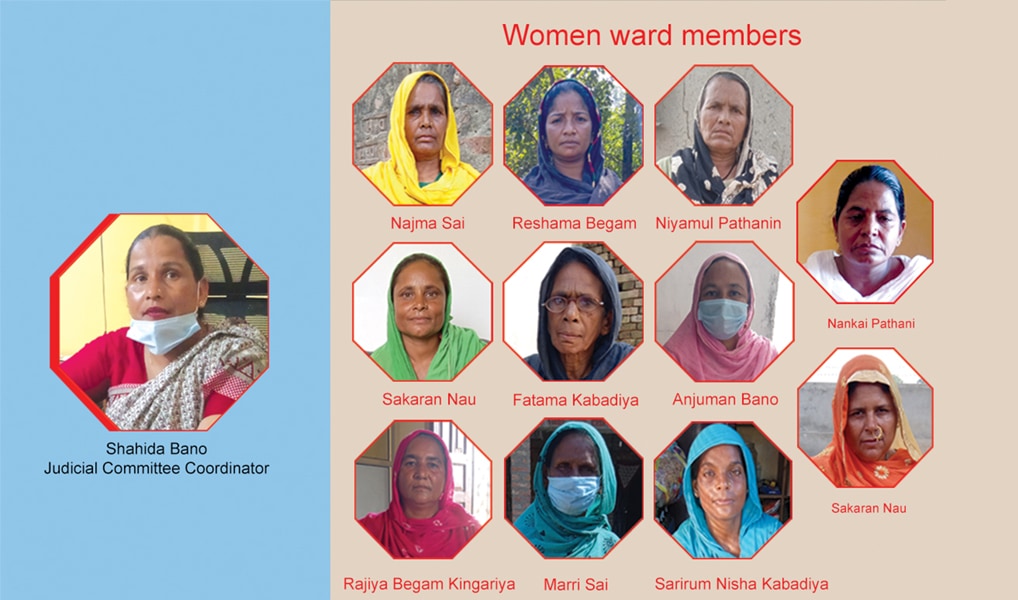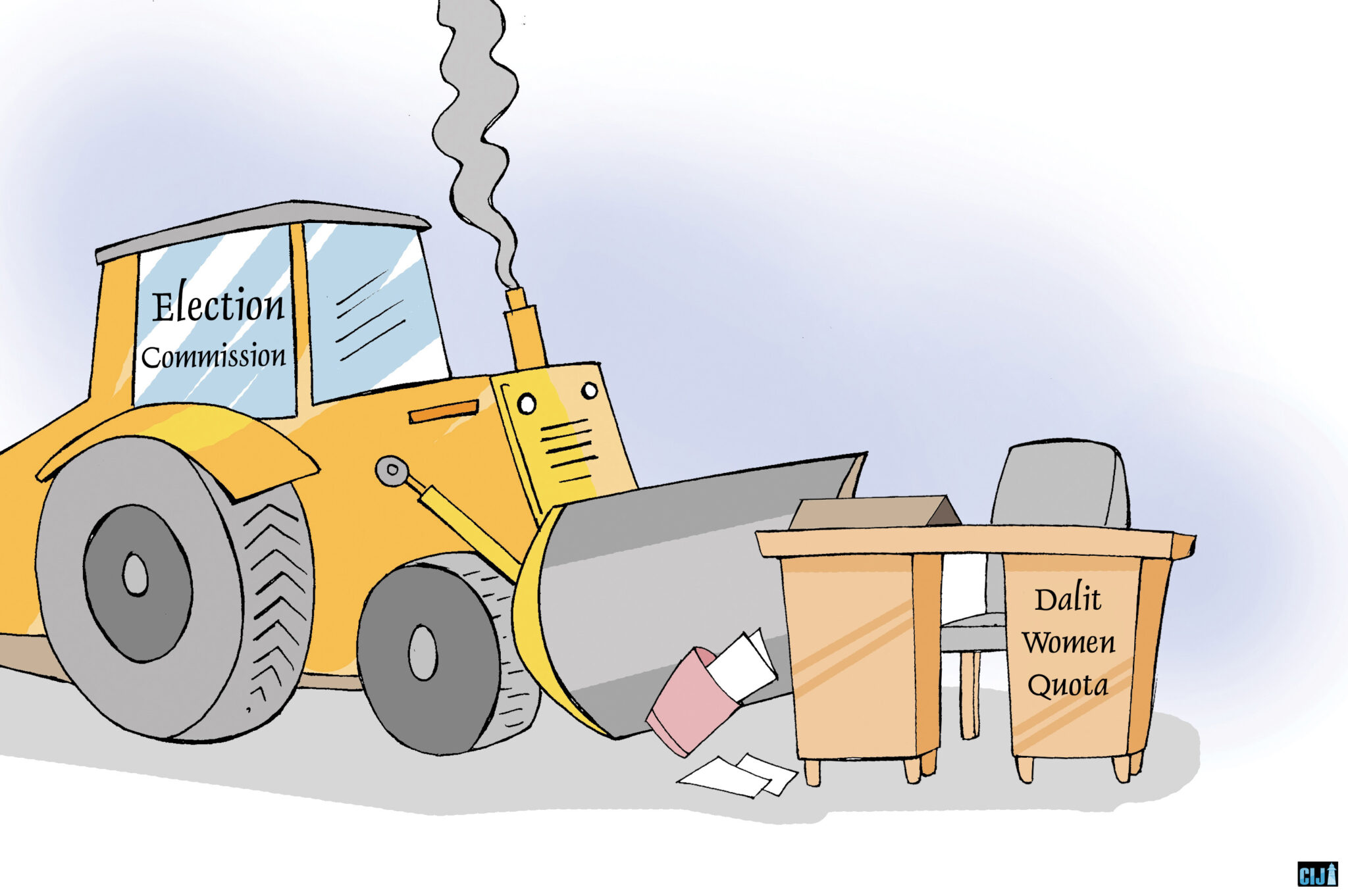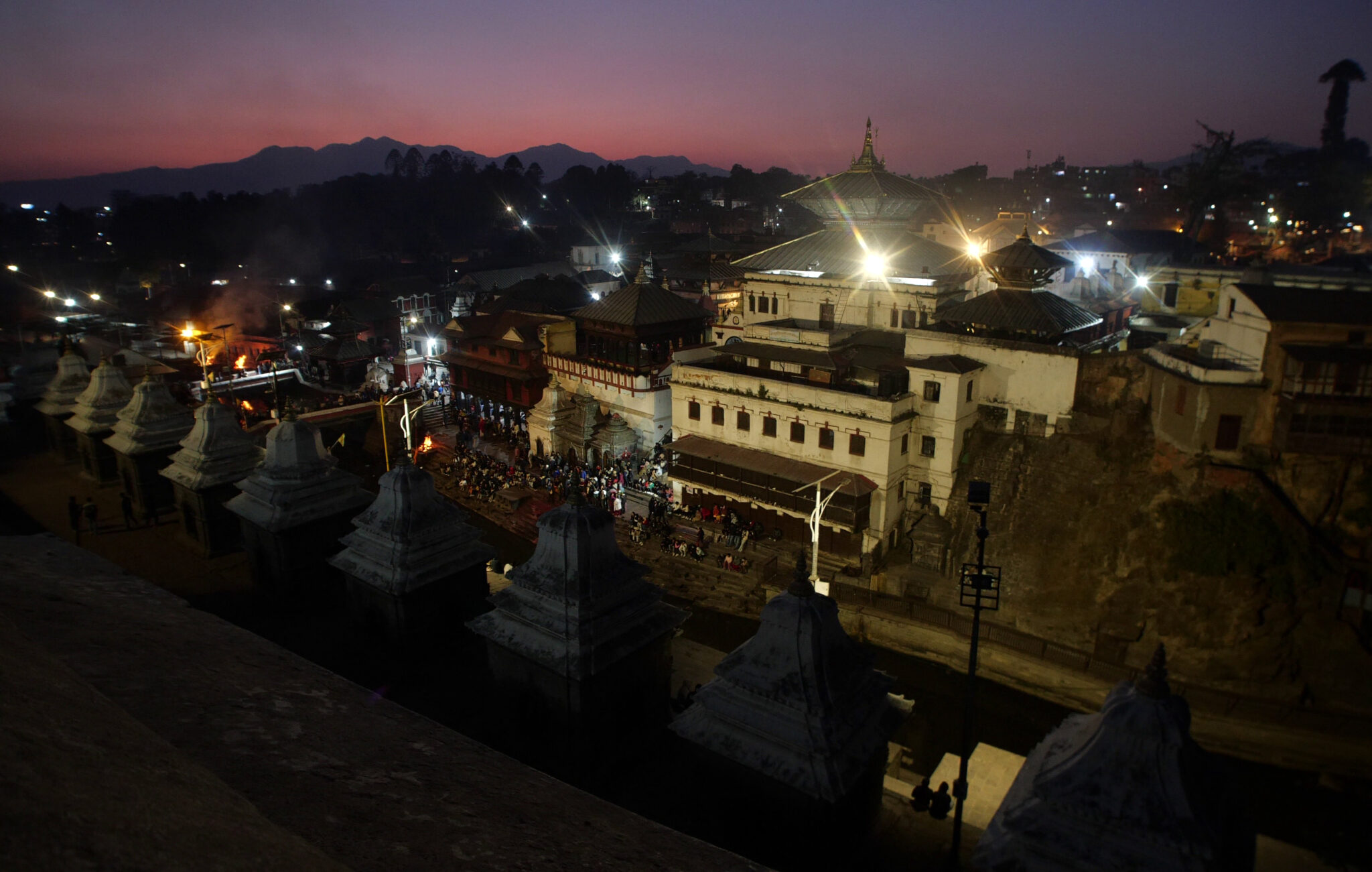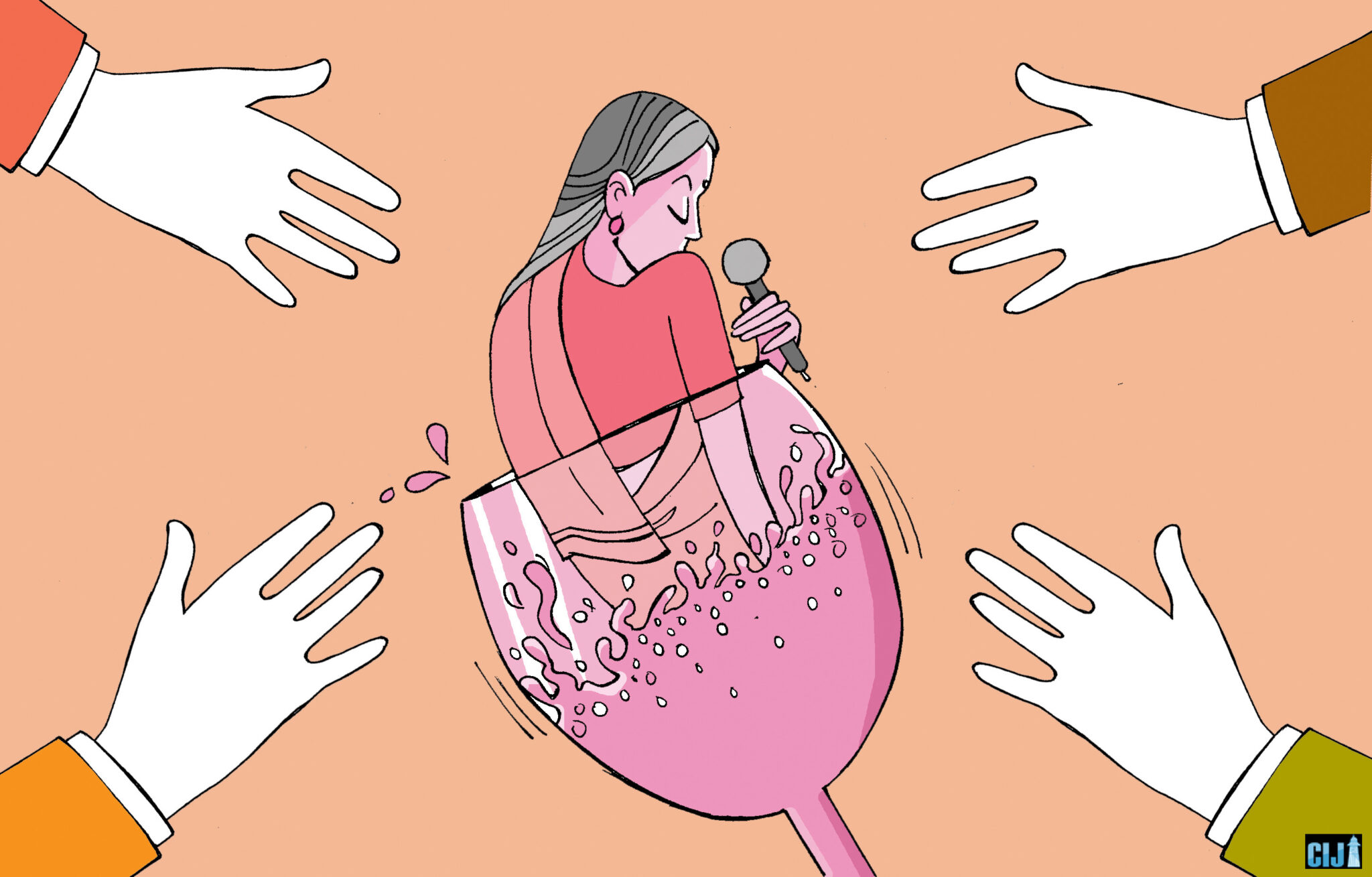While many local units have been plagued with allegations of corruption and irregularities, the Muslim women elected in local units in Banke and Bardiya have delivered a hopeful performance, “bringing democracy to every doorsteps”.
Prem Biswakarma, Centre for Investigative Journalism-Nepal
In the past two years, Shahida Bano, vice chair of Duduwa Rural Municipality in Dang, examined over 70 complaints. Shahida is the coordinator of the rural municipality’s judicial committee. In handling one of the complaints, Shahida saved the relationship of a married couple on the verge of divorce. The couple was about to visit the court for divorce. But their relationship continued after they were reconciled by the judicial committee. “I am happy that I could save a household from dissolution out of a small feud,” Shahida says. The case was from the fiscal year 2019/20.
Between last year and this year’s mid-October, Duduwa’s judicial committee has registered 39 cases of property exchange, six of household feuds, 24 related to land ownership and a single case of divorce. “Because I didn’t have any experience with social work, the year after my election was spent socializing,” Shahida says. “At first, I was apprehensive about my job. I couldn’t even speak in Nepali. But gradually, I learned to do both. The work got easier from the second year.”
Likewise, Rajiya Begam Kingariya, a ward member of Nepalgunj Submetropolis-22, didn’t know how to go about her job when she was first elected. She gradually got comfortable after participating in the formulation of budget and plan and policies programs. Today, Kingariyapur, Rajiya’s native village, has an access to electricity. The locals have been relieved of the decades-long compulsion to stay in the dark.
This change was an outcome of Rajiya’s understanding of the budget formulation process. “Not only has the village got an access to electricity but also to a motorable road,” she says. “I have tried, as much as I can, to boost the morale of women residents of the village. But the achievement I am most satisfied with is the decline in the number of case of violence against women.”
According to Rajiya, the infrastructure development projects in her ward sees an active participation of the ward members. “The ward chair alone can’t do everything,” she adds. “We all take part.”
In ward 1 of Narainapur, another rural municipality in Banke, the perennially muddy roads have worn a new look after Najma Sai of Katkuniya was elected as member of the ward. The perils of travelling through mud-caked roads, especially during the rainy season, have disappeared. “About 300,000 was spent while giving the roads a facelift with the help of 12 laborers and a tractor,” says Tirali Sai (Nanke), a local. “The whole village is relieved thanks to Najma’s efforts.” Najma often visits the village to know if the roads need makeover. “I am now making efforts to gravel the roads,” she says.
This is an illustration of the confidence of Banke’s local representative Muslim women to run the local units.
Meanwhile, in Bardiya, Banke’s neighboring district, Reshama Begam Khan, a ward member of Gulariya Municipality-12, has boosted the confidence of not just her own but also other women in the ward. Since her election, the women in the ward, previously confined to household works, have started participating in public meetings. “Rarely would any women in the ward get out of their home,” Reshama says. “Today, they are confidently taking part in meetings significant to the development of the ward. The number of those visiting health post to inoculate their children has also increased.”
Many things have changed in the village today. Life has become easier. Since Reshama’s election, the village temple and Kabrastan (the tomb for the Muslims) have been equipped drinking water taps. “It was a big trouble when the Kabrastan had no water tap,” says Shahadat Ali, a local. “We were compelled to bring water from elsewhere while burying our dead. Now that problem is solved.”
The work carried out in the fiscal year 2019/20 has benefitted not only the Muslim community but the whole of village. But Reshama says it was just a little effort on her part. “I have taken formal education, but after being elected, I have learned to speak, understand and socialize,” she says.
Before Marri Sai was elected as member of Gulariya Municipality’s ward-11, many women in her village would cover their faces, many wouldn’t wear anything other than burka. They couldn’t get out of their home without the company of their husbands. Today, following in Marri’s footsteps, they are learning new skills. Helped by Marri, 27 women from impoverished backgrounds have been taking tailoring trainings. “Today, besides the newly-married, many women get out alone,” Marri says. “It makes me happy to see it.”
“Many things have changed now,” Nisha Sai, a 31-year-old local, says. “I no longer wear burka exclusively. Many women get out alone. And they can work outside.”
Since her election, Marri has been counseling the village women to share their problems, to register their marriage and to get a citizenship certificate. She has also suggested them to not discriminate between boys and girls. The effect is manifest in the village. “I hold discussions in ward office to solve the problems of women,” she says. “I can openly express myself in public.”
Confidence beyond the comfort of one’s home
Shahida Bano, the deputy chair of Duduwa, had stepped outside of her home and stopped wearing burka after 22 years after her election. Just how did this happen after all those years? There is an interesting backstory to this. “Once my father-in-law was denied of the ticket to contest the local level elections, the Nepali Congress party granted me the ticket to contest for the position of deputy chair,” she explains. “And I won.”
Shahida’s formal education was limited to seventh grade. Before the election, she used to wear only the burka. During the election campaign, many questioned her father-in-law why he had let her walk around outside. “Once I won the election, everyone’s fell quiet. And I gave up burka for sari,” she says. “Previously I used to be limited only to household chores, cooking, and readying children for school. Now it’s hard for me to have leisure time due to office work.”

Shahida, a member of the 24-strong extended family, believes that if the husbands of women and family members are considerate, it will be easier for them to hold jobs outside their home. “That has been my experience,” she says. “There are many women within the Muslim community who are educated. All they need is opportunities.”
Reshama Begam Khan, the 35-year-old ward committee member of Bardiya’s Gulariya Municipality-12, says that if there’s urgent office work, she gets out leaving household work. It’s all the easier since her husband is also a politician. “For me there’s no compulsion to wear a burka and stay inside home like before,” says Reshama, who was elected through the then Maoist (Centre) ticket. “I can wear the same dress inside and outside of home. If you need to socialize with the public, you need to be like them.”
Najma Sai, who was elected with the then Federal Socialist Forum (now Janata Samajbadi Party) ticket for ward member of Narainapur-1, uses sign language to express herself. While she has trouble speaking, her husband helps her with the job. That’s why she is confident. Fatama Kabadiya, 50, a member of Nepalgunj Sub-metropolis-16, has also garnered accolades for her work in her village.
Challenges amid opportunities
The board meetings of Nepalgunj Submetropolis and Narainapur Rural Municipality each see three Muslim women. “While the Muslim women are ready to come out of their home without burka, it is up to the men in positions of power to pave the way for them,” says Niyamul Pathanin, member of the Narainapur Rural Municipality’s executive.
Niyamul’s own life is an inspiring story. She got married at the age of 12. She was divorced when she was 16 and then remarried. “That I am a member of the executive is an honour and a source of inspiration,” says Niyamul, who is 61 now. Today, whenever a feud breaks out in the village, she is the first person everyone seeks out for. The villagers oblige by her decision.
Before she was elected, Nankai Pathani, the executive member of Nepalgunj Submetropolis who was elected with a Federal Socialist Forum ticket, used to trade corn with her husband. After her husband’s demise, she handled the business herself. Now her role has changed; she rejoices in public service. She got an opportunity to learn many things while attending the board meetings of the submetropolis’s executive, she says.
Nankai is equally invested in providing access to electricity and roads within the ward while she also helps people get birth, marriage and citizenship certificates. Moreover, she also “convinces” the guardian to send their children to school. “I didn’t send my daughter to school and married her off at a young age. After her husband married another woman, she has been staying with me,” says Nankai. “Now that I have understood the value of education, I am helping my daughter to get educated.” And she has been getting help from her family and the society, she says. “I think I have also earned respect from people. Everyone greets me with Namaste and invite me whenever there’s any problem.”
Sakaran Nau, who was elected as women ward member of Nepalgunj-23 with Federal Socialist Forum ticket, is illiterate. Her husband has migrated to Saudi Arabia to earn for a family of eight. Back home, Sakaran, 36, has engaged in public service alongside agriculture. “If I were educated, I could have worked more efficiently,” she says.
Still, many women from the Muslim community in her ward are confined within their homes. Sakaran has helped start skill-based training such as tailoring and mushroom farming targeting those women. “I get a call whenever there’s a problem in the ward,” she says. “We tend to visit the incident sites and help solve the issue.”
While Sarirum Nisha Kabadiya, a ward member of Nepalgunj Submetropolis-14, says that engaging in politics and social work is not easy for those women with poor economic status. Sairum, 32, who was also elected with a Federal Socialist Forum ticket, is also illiterate. But her husband, Kurban Ali, helps her when she needs it, she says. Her family members, especially her mother-in-law, are supportive as well, making her work easier. “I work as a bridge between the ward office and the village,” she says.
Learning for the future
In Banke and Bardiya, where the predominant mother-tongues are Awadhi and Hindi, the elected women local representatives have a hard time communicating in Nepali, the official language of the Nepal government. But despite the problem with language, they have been learning with experience. Today, there’s no restriction on what clothes to wear. And the representatives are getting used to technology. Even though they may not know how to contact someone, they know how to receive the call on their cellphones. It is only recently that Sakarun Begam, the ward member of Narainapur-3, learned to use the cellphone.
Sakarun attends the ward meeting thrice a month and besides that, helps her villagers sort out their problems. It’s been easier to carry out her job since her husband, Salauddin Khan, is an active local politician of Nepali Congress. “I have realized your mind won’t open up until you let go of societal strictures, such as wearing burka all the time,” says Sakarun, 45. “If I get the ticket in the next elections, I will contest for the post of deputy chair.”
Nepali law has the provision for having at least one woman in the post of either chief or deputy chief of the local unit, including one women and one dalit women in ward committee. This has increased the representation of women in local units. The result is from villages to towns, women have gotten a chance to govern themselves.
The Muslim women, formerly confined to the four walls of their homes, have been hugely benefitted, getting a chance to reconfigure their lifestyle. They want to cash in this opportunity to learn more about the wider world. They have now realized that it’s not only the strictures of family and society that hamper their growth, but their own knowledge and decision-making skills. “Things in the outside world are different than what we had thought,” says Sakarun.
The local level elections of 2017 have proven to be a happy coincidence for the Muslim women representatives in Banke and Bardiya. They have not gotten into politics with plan but as a result of a culmination of many coincidences. Now, however, they are able to make political plans by themselves. “I will contest the election next time too, this time in a higher position than just a member,” says Anjuman Bano Ansari, a ward member of Nepalgunj Submetropolis-5. Anjuman, a member of Rastriya Prajatantra Party, is literate.
Likewise, Rajiya Begam Kingariya of Nepalgunj-22 is also seeking to contest for a higher position come next election. “It is imperative women should be in power to uplift other women,” says Rajiya, who is 42. She is illiterate but her family’s political background has been of much help, she says.
Changing political landscape
Among the 16 local units in Banke and Bardiya, Ishtiyak Ahmed Shah of Narainapur Rural Municipality is the only Muslim head of the local unit. “While previously, Muslim women would feel uncomfortable getting out their homes, let alone express themselves, things have changed a lot today,” he says. “I have been encouraging the Muslim elected representatives in our local unit to claim their rights. And they are much more comfortable expressing themselves. Things have changed.”
Shah adds that the role of women representatives has been instrumental in ushering infrastructural development in the local unit.
Of the total 421 elected representatives in Banke, scores are from the Muslim community—including one head of local unit, one women deputy head of local unit, 16 chief of wards, 15 women ward members and 36 male ward members. Likewise in Bardiya, of the 391 elected officials, representing Muslim community are three male ward chairs, three women ward members, and one male ward member.
Even though the number is not high, the representation of Muslim community, especially women, has left an impression. “In our local unit, there’s one Muslim women ward member and she has been performing well,” says Ekmaya BK, deputy chair of Khajura Rural Municipality in Banke. “Things might be different in other local units.” BK suggests that the women representing Muslim community need to be trained politically, which might further help them broaden their thoughts.
While the number of Muslim women representatives is still very low, the circumstances have changed, says Ajaykumar Srivastav, coordinator of District Coordination Committee, Banke. “Things are different today, for the situation where Muslim women wouldn’t get out of their home and wear burka has changed,” he says. “It is important that Muslim women have been registering their presence in public forums.”
But despite that, for a lack of education in the marginalized committee, the work of the Muslim women representatives has yet to be effective, said Srivastav. “Precisely to solve this problem of illiteracy among women, all the local units in Banke have forwarded a plan to construct schools exclusively devoted to girl students,” he said.



